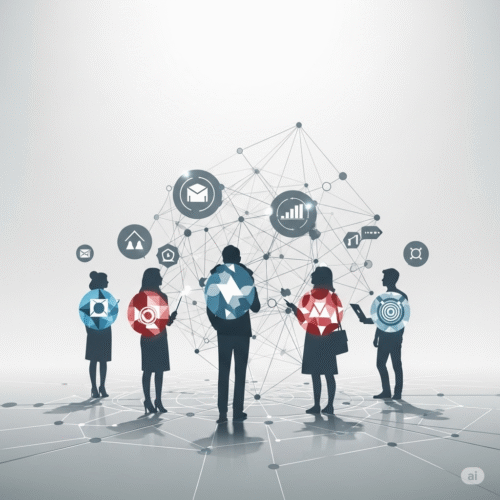The AI Impact on Jobs is undeniable, transforming industries and roles across the globe. This technological wave is rapidly changing how we work and what skills are valued. Thus, understanding these shifts is more important than ever.
This evolution presents both exciting opportunities for innovation and new challenges for the workforce. While some tasks become automated, new roles emerge, demanding fresh competencies. Consequently, proactive adaptation is key to navigating this new landscape.
To thrive, individuals must embrace lifelong learning and focus on acquiring skills that complement AI. Staying informed about the AI Impact on Jobs helps in making strategic career choices. This article explores these changes and essential skills.
Defining Artificial Intelligence in the Workplace
Artificial intelligence, or AI, refers to computer systems designed to perform tasks that typically require human intelligence. These tasks include learning, problem-solving, and decision-making. AI systems analyze vast amounts of data to identify patterns.
In contemporary workplaces, AI is increasingly utilized to automate routine processes and enhance operational efficiency. For example, it can manage customer inquiries or optimize supply chains. Moreover, AI provides powerful tools for data analysis, offering deeper insights.
Its integration aims to augment human capabilities, leading to increased productivity and innovative solutions. However, this also reshapes job roles and skill requirements. Understanding AI’s function is the first step to adapting to its presence.
Understanding the AI Impact on Jobs Currently
Currently, many routine and repetitive tasks across various sectors are being automated by sophisticated AI systems. This includes data entry, basic customer service, and assembly line work. Consequently, the nature of human work is shifting.
This automation leads to job displacement in certain traditional roles, which is a significant concern. However, the AI Impact on Jobs also involves the creation of entirely new job categories. These often relate to AI development, management, and ethics.
Ultimately, roles are evolving rather than simply disappearing; AI often acts as a tool. Humans are increasingly needed to oversee AI, interpret its outputs, and perform complex tasks requiring judgment. This necessitates a focus on upskilling.
Key Sectors Experiencing AI Transformation
AI’s transformative power is reshaping numerous industries with remarkable speed and efficiency. Here are key sectors where its influence is particularly prominent:
- Healthcare: AI enhances diagnostics, accelerates drug discovery, and enables personalized patient care plans.
- Finance: It drives fraud detection systems, algorithmic trading, and AI-powered customer service bots.
- Manufacturing: AI powers smart robotics, improves quality control, and optimizes intricate supply chains.
- Retail: It facilitates personalized shopping experiences, dynamic pricing, and smart inventory management.
- Transportation: AI is crucial for developing autonomous vehicles and optimizing complex logistics routes globally.
Essential Soft Skills to Cultivate Now
As AI handles more technical tasks, uniquely human soft skills become increasingly valuable in the workplace. These skills differentiate human workers and are difficult for AI to replicate authentically. Therefore, their development is crucial.
Critical thinking and complex problem-solving abilities are highly sought after by employers. These skills allow individuals to analyze situations, make reasoned judgments, and devise innovative solutions. Furthermore, they help in managing AI systems effectively.
“Creativity, emotional intelligence, and adaptability define future-proof roles, enabling humans to collaborate effectively with AI and each other.”
Vital Technical Skills for an AI-Driven Future
Alongside soft skills, specific technical competencies are vital for navigating the AI-driven future. Data literacy, the ability to read, work with, analyze, and argue with data, is paramount. This skill is fundamental in nearly every industry today.
A foundational understanding of AI and machine learning concepts provides a significant advantage. While not everyone needs to be an AI developer, knowing how these technologies work is beneficial. This helps in leveraging AI tools effectively.
Strong digital proficiency and comfort with adopting new software tools are also essential. The workplace is becoming increasingly digital, and the ability to quickly learn and use new technologies is key. This ensures seamless integration with AI systems.
The Synergy of Human and Artificial Intelligence
The future of work likely involves a powerful synergy between human intelligence and artificial intelligence. Rather than outright replacement, AI is poised to augment human capabilities significantly. This collaboration is a core aspect of the AI Impact on Jobs.
AI systems excel at processing vast datasets and performing repetitive tasks with speed and accuracy. This frees up human workers to concentrate on more strategic, creative, and interpersonal aspects of their roles. Thus, efficiency can be greatly enhanced.
This partnership can lead to breakthroughs in innovation and productivity across many fields. Humans will guide AI, interpret its outputs, and ensure ethical application. Therefore, roles will evolve to focus on these oversight functions.
Adapting to the evolving job market requires a proactive stance towards personal development. Lifelong learning is no longer merely a suggestion but a necessity for career resilience. This involves continuously updating skills and knowledge.
Individuals must actively seek out opportunities for upskilling and reskilling to stay relevant. This can include enrolling in online courses, attending workshops, or pursuing certifications in emerging areas. Consequently, adaptability becomes a core competency.
Furthermore, on-the-job training and seeking mentorship can provide practical experience and guidance. Networking with professionals in AI-related fields also offers valuable insights and potential opportunities. This proactive engagement is crucial for success.
Hard Skills vs. Soft Skills: The AI Perspective
Understanding the interplay between hard and soft skills is crucial in an AI-influenced job market. Both types remain essential, but their relative importance is shifting. This table highlights key differences and AI’s role:
| Feature | Soft Skills (Human-Centric) | Hard Skills (Technical) | AI Complementation |
|---|---|---|---|
| Nature | Interpersonal, character traits | Teachable, specific abilities | Augments both, automates some hard tasks |
| Examples | Communication, empathy, leadership | Coding, data analysis, AI tools | AI assists, humans guide and interpret |
| AI Replication | Difficult to replicate genuinely | Increasingly replicable/automatable | AI tools enhance hard skill application |
| Future Value | Increasingly vital, less automatable | Crucial, but require constant updates | Synergy needed for best outcomes |
| Development | Experience, self-reflection, interaction | Training, education, direct practice | Lifelong learning for both skill sets |
Both hard and soft skill sets remain vital for professionals navigating the evolving job market influenced by AI. These skills complement each other, creating a well-rounded professional profile that is adaptable.
While AI can automate or assist with many hard skills, uniquely human soft skills guide its ethical application. For instance, empathy and critical thinking are essential for responsible AI deployment. This makes soft skills increasingly indispensable.
A balanced development approach, focusing on both technical competencies and human-centric abilities, ensures career adaptability. This holistic strategy helps individuals thrive alongside advancing AI technologies, securing their place.
Ethical Considerations and AI in Employment
The rapid advancement and integration of AI into employment bring forth significant ethical considerations. Job displacement due to automation is a primary concern that requires careful societal planning. This includes supporting affected workers.
Issues such as data privacy, algorithmic bias in hiring or performance reviews, and worker surveillance also need careful attention. Ensuring fairness and transparency in AI systems is crucial. Therefore, robust ethical guidelines are necessary.
Societies, businesses, and policymakers must collaborate to develop frameworks for the responsible deployment of AI in the workplace. This includes promoting ethical AI development and ensuring that benefits are shared broadly. The AI Impact on Jobs must be managed equitably.
Preparing for the Future of Work with AI
Preparing for the future of work, fundamentally altered by AI, is a shared responsibility. Governments, educational institutions, businesses, and individuals all play crucial roles in this transition. Collaborative efforts are essential for success.
Significant investment in education and training programs is key to equipping the workforce with future-ready skills. This includes revamping curricula to emphasize critical thinking, creativity, and digital literacy. Access to such programs must be widespread.
Fostering a culture of adaptability and continuous learning within organizations and society will ease the AI Impact on Jobs. Encouraging curiosity and providing resources for skill development can help individuals embrace change. This proactive mindset is vital.
Conclusion
The AI Impact on Jobs is profound, actively reshaping how we work, the skills we need, and future career paths. This transformation brings both challenges and immense opportunities for growth and innovation. Adapting is not optional.
Staying relevant in this new era demands a commitment to lifelong learning and skill development. Key areas include critical thinking, creativity, emotional intelligence, and technical literacy in AI and data. These are foundations.
Ultimately, proactive adaptation, focusing on uniquely human strengths and embracing collaboration with AI, is vital for individual and collective success. By understanding and preparing for the AI Impact on Jobs, we can navigate the future effectively.
Also Read 👋
Reference Article
The Impact of AI on the Job Market and Employment Opportunities
Call to Action
Embrace the change! Start your upskilling journey today to thrive in the AI-powered future. Your adaptability is your greatest asset.
Short Disclaimer: This article provides informational content and is not a substitute for professional career or financial advice. Always consult with qualified experts for personalized guidance.
Discover more from I-PICKS
Subscribe to get the latest posts sent to your email.


